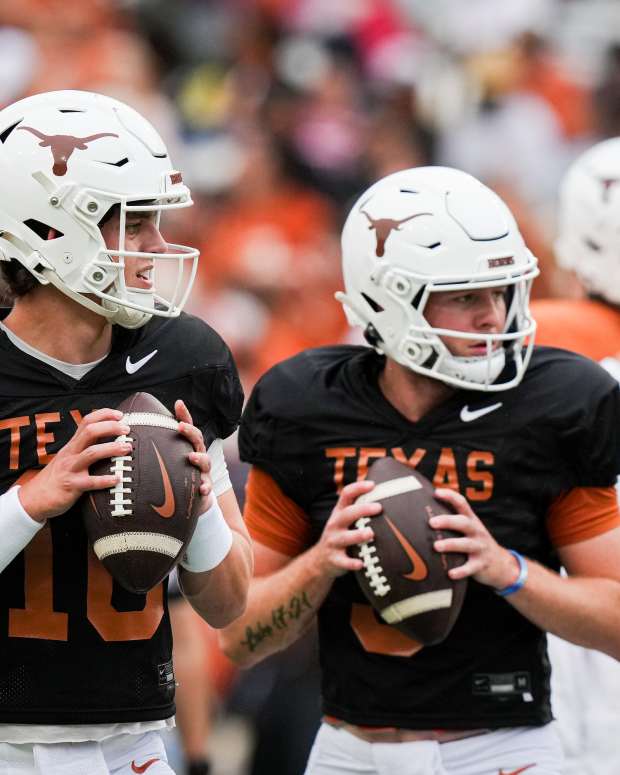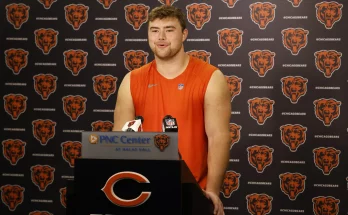Quinn Ewers has never been one to mince words. The former five-star prodigy turned Texas Longhorns quarterback has made a habit of letting his play—and sometimes his pointed commentary—do the talking. But his most recent offhand remark has rippled through the college football world in a way that few anticipated, ruffling feathers and reigniting old conversations about power, prestige, and relevance. In an interview meant to focus on Texas’ upcoming season and his NFL Draft prospects, Ewers casually threw shade at one of college football’s most storied programs, leaving fans and alumni scrambling to defend their school’s honor.
The comment came during a relaxed moment in a podcast interview, when Ewers was asked about what he believed separated Texas from other traditional programs. His response was immediate and confident: “We’re built for now. Some programs still live off what they did 30 or 40 years ago. That’s not us.” While he didn’t name any school in particular, the implication was loud enough to echo throughout the sport.
It didn’t take long for the internet to connect the dots. Fans and analysts speculated that Ewers was taking a subtle jab at Nebraska—a once-dominant, now-faded powerhouse that ruled the college football landscape in the 1990s and early 2000s but has struggled to find its footing in the modern era. Nebraska hasn’t posted a double-digit win season since 2012 and hasn’t won a national title since 1997. Their last conference title came in 1999. And while the Cornhuskers still fill Memorial Stadium every Saturday in Lincoln, their days of national relevance feel more like pages in a history book than current headlines.
The notion that a player like Ewers would casually dismiss Nebraska as a relic of the past hits hard. It’s not just about one comment—it’s about what that comment represents. In the ever-evolving world of college football, where TV contracts, NIL deals, conference realignment, and social media clout drive the conversation, tradition sometimes gets left behind. And in that gap between past glory and present power, schools like Nebraska find themselves walking a tightrope, balancing respect for their heritage with a desperate need to evolve.
To Nebraska fans, the remark felt like salt in an open wound. The program has endured years of mockery and mediocrity, cycling through coaches and quarterbacks in search of a return to greatness. Scott Frost was supposed to be the savior, the hometown hero turned head coach, but his tenure ended in disappointment. Now, under Matt Rhule, there’s cautious optimism, but the climb back to national relevance is steep. For a program that once stood toe-to-toe with the likes of Miami, Florida State, and Oklahoma, it’s hard to stomach being spoken about as a footnote.
But Ewers’ comment doesn’t just strike at Nebraska—it raises a larger question: In modern college football, how much does history really matter?
For players like Ewers—products of the social media generation, raised on highlight reels and weekly rankings—the past often feels distant. What matters is exposure, opportunity, and winning right now. Texas, despite its own decade-long battle with mediocrity before Steve Sarkisian’s resurgence, offers players access to massive NIL deals, national television slots, and a rabid fanbase ready to believe in the future. For many recruits, that’s more compelling than the distant echo of championships won before they were born.
Yet there’s a certain irony in Ewers’ comment. Texas itself is no stranger to underachievement. The Longhorns haven’t won a national title since 2005 and have often been ridiculed for being “back” year after year without the results to prove it. It wasn’t until the 2023 season that Texas truly reasserted itself as a top-tier contender, making a run to the College Football Playoff and reminding the sport of the program’s immense potential when firing on all cylinders.
That recent success, combined with Ewers’ high-profile status and undeniable arm talent, has given him a platform—and he’s using it. Whether intentional or not, his comments serve as a wake-up call to the sport’s traditional powers. In a landscape that changes by the month, nostalgia isn’t enough. Facilities, branding, coaching, and results matter more than ever. And if you can’t keep up, even the blue bloods get left behind.
Still, there’s something uniquely college football about the way history clings to programs. It’s why Notre Dame can still fill stadiums and command primetime slots without a recent title. It’s why Michigan’s 2023 national championship felt like the restoration of something sacred. And it’s why Nebraska, despite its fall from grace, remains a source of pride for an entire state. Football in Lincoln isn’t just a pastime—it’s an identity.
That’s what makes the sting of Ewers’ words so deep. For Nebraska fans, it’s not just about wins and losses—it’s about respect. And to be dismissed, even indirectly, by a quarterback who wasn’t alive for the program’s last title run, feels like a punch to the gut.
To their credit, Nebraska fans responded with the kind of passion that has defined the program for generations. Message boards lit up. Former players chimed in on social media. One former Huskers lineman tweeted, “We’ll see where Texas is in 30 years. I bet our fans will still show up.” Another shared a photo of Nebraska’s national title trophies, captioned simply: “We don’t have to talk about it. We lived it.”
It’s a valid point. College football’s beauty lies in its blend of past and present. The roar of 80,000 fans in Lincoln, the sea of red, the tunnel walk—it all means something, even if the wins haven’t kept pace. And while Ewers may not see that value, those who’ve worn the scarlet and cream certainly do.
For Texas, the incident will likely be a mere footnote in a season filled with hype and expectation. With Arch Manning waiting in the wings and the Longhorns set to enter the SEC, the spotlight will only grow brighter. Ewers, should he remain healthy and deliver on his promise, will likely be a top NFL Draft pick and remembered as the quarterback who helped restore Texas’ swagger.
But for Nebraska, the stray shot from Ewers could be a rallying cry. Programs in transition often need something—anything—to ignite a spark. Bulletin board material comes in all forms, and sometimes it’s a single sentence from a quarterback hundreds of miles away. If Rhule’s team needs motivation, they have it now.
The bigger takeaway is this: College football is changing. The power structures are shifting. But respect, once earned, should never be taken lightly. Ewers, knowingly or not, poked the pride of one of the sport’s most passionate fanbases. Whether Nebraska responds with wins or more soul-searching remains to be seen. But one thing is certain—when you speak about legacy, you better be ready for the echoes that follow.
In the end, Ewers may have simply spoken what many in the younger generation believe: That the game is about now. And in that version of reality, Texas is ascending. But for the rest of college football—especially those who remember Saturdays dominated by the Blackshirts and the relentless, punishing style of Tom Osborne’s teams—the past isn’t a liability. It’s a badge of honor.
And if history has taught us anything, it’s that programs rise and fall in cycles. Today’s power is tomorrow’s punchline. Today’s shade is tomorrow’s regret. And somewhere in Lincoln, in a film room or weight room or locker room, a young Cornhusker is replaying that clip, letting it sink in, and preparing to prove that the past still has something to say about the future.



